- Home
- Ken Follett
Storm Island Page 3
Storm Island Read online
Page 3
want a drink."
Terry did not look at his menu.
"Seriously, Percy, why are you still in Town?"
Godliman's eyes seemed to clear, like the image on a screen when the
projector is focused, as if he had to think for the first time since he
walked in.
"It's all right for children to leave, and national institutions like
Bertrand Russell. But for me well, it's a bit like running away and
letting other people fight for you. I realize that's not a strictly
logical argument. It's a matter of sentiment, not logic."
Terry smiled the smile of one whose expectations have been fulfilled.
But he dropped the subject and looked at the menu. After a moment he
said: "Good God. Le Lord Woolton Pie."
Godliman grinned.
"I'm sure it's still just potatoes and vegetables."
When they had ordered, Terry said: "What do you think of our new Prime
Minister ?"
"The man's an ass. But then, Hitler's a fool, and look how well he's
doing. You?"
"We can live with Winston. At least he's bellicose."
Godliman raised his eyebrows. "We?" Are you back in the game?"
"I never really left it, you know."
"But you said ' "Percy. Can't you think of a department whose staff
all say they don't work for the Army?"
"Well, I'm damned. All this time..."
Their first course came, and they started a bottle of white Bordeaux.
Godliman ate potted salmon and looked pensive.
Eventually Terry said: "Thinking about the last lot?"
Godliman nodded.
"Young days, you know. Terrible time." But his tone was wistful.
"This war isn't the same at all. My chaps don't go behind enemy lines
and count bivouacs like you did. Well, they do, but that side of
things is much less important this time. Nowadays we just listen to
the wireless."
"Don't they broadcast in code?"
Terry shrugged.
"Codes can be broken. Candidly, we get to know just about everything
we need these days."
Godliman glanced around, but there was no one within earshot, and it
was not for him to tell Terry that careless talk costs lives.
Terry went on: "In fact my job is to make sure they don't have the
information they need about us."
They both had chicken pie to follow. There was no beef on the menu.
Godliman fell silent, but Terry talked on.
"Canaris is a funny chap, you know. Admiral Wilhelm Canaris, head of
the Abwehr. I met him before this lot started. Likes England. My
guess is he's none too fond of Hitler. Anyway, we know he's been told
to mount a major intelligence operation against us, in preparation for
the invasion but he's not doing much. We arrested their best man in
England the day after war broke out. He's in Wandsworth prison now.
Useless people, Canaris's spies. Old ladies in boarding-houses, mad
Fascists, petty criminals ' Godliman said: "Look here, old boy, this is
too much." Hetrembled slightly with a mixture of anger and
incomprehension.
"All this stuff is secret. I don't want to know!"
Terry was unperturbed.
"Would you like something else?" he offered.
"I'm having chocolate ice-cream."
Godliman stood up.
"I don't think so. I'm going to go back to my work, if you don't
mind."
Terry looked up at him coolly. The world can wait for your reappraisal
of the Plantagenets, Percy. There's a war on, dear boy. I want you to
work for me."
Godliman stared down at him for a long moment.
"What on eardiwouldldo?"
Terry smiled wolfishly.
"Catch spies."
Walking back to the college, Godliman felt depressed despite the
weather. He would accept Colonel Terry's offer: no doubt about that.
His country was at war; it was a just war; and if he was too old to
fight, he was still young enough to help.
But the thought of leaving his work and for how many years? depressed
him. He loved history, and he had been totally absorbed in medieval
England since the death of his wife ten years ago. He liked the
unravelling of mysteries, the discovery of faint clues, the resolution
of contradictions, the unmasking of lies and propaganda and myth. His
new book would be the best on its subject written in the last hundred
years, and there would not be one to equal it for another century. It
had ruled his life for so long that the thought of abandoning it was
almost unreal, as difficult to digest as the discovery that one is an
orphan and no relation at all to the people one has always called
Mother and Father.
An air-raid warning stridently interrupted his thoughts. He
contemplated ignoring it: so many people did now, and he was only ten
minutes' walk from the college. But he had no real reason to return to
his study he knew he would do no more work today. So he hurried into a
Tube station and joined the solid mass of Londoners crowding down the
staircases and on to the grimy platform. He stood close to the wall,
staring at a Bovril poster, and thought: But it's not just the things
I'm leaving behind.
Going back into the game depressed him, too. There were some things
he liked about it: the importance of little things, the value of simply
being clever, the meticulousness, the guesswork. But he hated the
blackmail and the treachery, the deceit, the desperation, and the way
one always stabbed the enemy in the back.
The platform was becoming more crowded. Godliman sat down while there
was still room, and found himself leaning against a man in bus-driver's
uniform. The man smiled and said: "Oh to be in England, now that
summer's here. Know who said that?"
TsTow that April's there," Godliman corrected him.
"It was Browning."
"I heard it was Adolf Hitler," the driver said. A woman next to him
squealed with laughter, and he turned his attention to her.
"Did you hear what the evacuee said to the farmer's wife?"
Godliman tuned out and remembered an April when he had longed for
England, crouching on a high branch of a plane tree, peering through a
cold mist across a French valley behind the German lines. He could see
nothing but vague dark shapes, even through his telescope, and he was
about to slide down and walk a mile or so farther when three German
soldiers came from nowhere to sit around the base of the tree and
smoke. After a while they took out cards and began to play, and young
Percival Godliman realized they had found a way of skiving off and were
here for the day. He stayed in the tree, hardly moving, until he began
to shiver and his muscles knotted with cramp and his bladder felt as if
it would burst. Then he took out his revolver and shot the three of
them, one after another, through the tops of their close-cropped heads.
And three people, laughing and cursing and gambling their pay, had
simply ceased to exist. It was the first time he killed, and all he
could think was: Just because I had to pee.
Godliman shifted on the cold concrete of the station platform and let
the memory fade awa
y. There was a warm wind from the tunnel and a
train came in. The people who got off found spaces and settled to
wait. Godliman listened to the voices.
"Did you hear Churchill on the wireless? We was listening in at the
Duke of Wellington. Old Jack Thornton cried. Silly old bugger..."
"From what I can gather Kathy's boy's in a stately home and got his own
footman! My Alfie milks the cow ..."
"Haven't had fillet steak on the menu for so long I've for-got ton the
bally taste ... wine committee saw the war coming and bought in twenty
thousand dozen, thank God ..."
"Yes, a quiet wedding, but what's the point in waiting when you don't
know what the next day's going to bring?"
"They call it Spring, Ma, he says to me, and they have one down here
every year..."
"She's pregnant again, you know ... yes, thirteen years since the last
... I thought I'd found out what was causing it!"
"No, Peter never came back from Dunkirk..."
The bus driver offered him a cigarette. Godliman refused, and took out
his pipe. Someone started to sing.
A blackout warden passing yelled "Ma, pull down that blind Just look at
what you're showing," and we Shouted "Never mind." Oh!
Knees up Mother Brown... The song spread through the crowd until
everyone was singing. Godliman joined in, knowing that this was a
nation losing a war and singing to hide its fear, as a man will whistle
past the graveyard at night; knowing that the sudden affection he felt
for London and Londoners was an ephemeral sentiment, akin to mob
hysteria; mistrusting the voice inside him which said "This, this is
what the war is about, this is what makes it worth fighting;' knowing
but not caring, because for the first time in so many years he was
feeling the sheer physical thrill of comradeship and he liked it.
When the all-clear sounded they went singing up the stair25 cases and
into the street, and Godliman found a phone box and called Colonel
Terry to ask how soon he could start
THREE
The small country church was old and very beautiful. A dry-stone wall
enclosed a graveyard where wild flowers grew. The church itself had
been there well, bits of it had the last time Britain was invaded,
almost a millenium ago. The north wall of the nave, several feet thick
and pierced with only two tiny windows, could remember that last
invasion; it had been built when churches were places of physical as
well as spiritual sanctuary, and the little round-headed windows were
better for shooting arrows out of than for letting the Lord's sunshine
in. Indeed, the Local Defence Volunteers had detailed plans for using
the church if and when the current bunch of European thugs crossed the
Channel.
But no jackboots sounded in the tiled choir in this August of 1940; not
yet. The sun glowed through stained-glass windows which had survived
Cromwell's iconoclasts and Henry VIIFs greed, and the roof resounded to
the notes of an organ which had yet to yield to woodworm and dry rot.
It was a lovely wedding. Lucy wore white, of course; and her five
sisters were bridesmaids in apricot dresses. David wore the Mess
uniform of a Flying Officer in the Royal Air Force, all crisp and new
for it was the first time he had put it on. They sang Psalm 23" The
Lord's My Shepherd, to the tune Crimond.
Lucy's father looked proud, as a man will on the day his eldest and
most beautiful daughter marries a fine boy in a uniform. He was a
farmer, but it was a long time since he had sat on a tractor: he rented
out his arable land and used the rent to raise racehorses, although
this winter of course his pasture would go under the plough and
potatoes would be planted. Although he was really more gentleman than
farmer, he nevertheless had the open-air skin, the deep chest, and the
big stubby hands of agricultural people. Most of the me non that side
of the church bore him a resemblance: barrel-chested men, with
weathered red faces, those not in tail coats favouring tweed suits and
stout shoes.
The bridesmaids had something of that look, too; they were country
girls. But the bride was like her mother. Her hair was a dark, dark
red, long and thick, shining and glorious, and she had wide-apart amber
eyes set in an oval face; and when she looked at the vicar with that
clear, direct gaze and said "I will' in that firm, clear voice, the
vicar was startled and thought, "By God she means it!" which was an
odd thought for a vicar to have in the middle of a wedding.
The family on the other side of the nave had a certain look about them,
too. David's father was a lawyer: his permanent frown was a
professional affectation, and concealed a sunny nature. (He had been a
Major in the Army in the last war, and thought all this business about
the R.A.F and war in the air was a fad which would soon pass.) But
nobody looked like him, not even his son who stood now at the altar
promising to love his wife until death, which might not be far away,
God forbid. No, they all looked like David's mother, who sat beside her
husband now, with almost-black hair, dark skin and long, slender
limbs.
David was the tallest of the lot. He had broken high-jump records last
year at Cambridge University. He was rather too good-looking for a man
his face would have been feminine were it not for the dark,
ineradicable shadow of a heavy beard. He shaved twice a day. He had
long eyelashes, and he looked intelligent, as he was, and sensitive,
which he was not.
It was idyllic: two happy, handsome people, children of solid,
comfortably off, backbone-of-England type families, getting married in
a country church in the finest summer weather Britain can offer.
When they were pronounced man and wife both mothers were dry-eyed, and
both the fathers cried.
Kissing the bride was a barbarous custom, Lucy thought as yet another
middle-aged pair of champagne-wet lips smeared her cheek. It was
probably descended from even more barbarous customs in the Dark Ages,
when every manin the tribe was allowed to well, anyway, it was time we
got properly civilized and dropped the whole business.
She had known she would not like this part of the wedding. She liked
champagne, but she was not crazy about chicken drumsticks or dollops of
caviar on squares of cold toast, and as for the speeches and the
photographs and the honeymoon jokes, well ... But it could have been
worse. If it had been peacetime Father would have hired the Albert
Hall.
So far nine people had said, "May all your troubles be little ones,"
and one person, with scarcely more originality, had said, "I want to
see more than a fence running around your garden." Lucy had shaken
countless hands and pretended not to hear remarks like, "I wouldn't
mind being in David's pyjamas tonight." David had made a speech in
which he thanked Lucy's parents for giving him their daughter, as if
she were an inanimate object to be gift-wrapped in white satin and
presented to the most deserving applicant. Lucy'
s father had been
crass enough to say that he was not losing a daughter but gaining a
son. It was all hopelessly gaga, but one did it for one's parents.
A distant uncle loomed up from the direction of the bar, swaying
slightly, and Lucy repressed a shudder. She introduced him to her
husband.
"David, this is Uncle Norman."
Uncle Norman pumped David's bony hand.
"Well, m'boy, when do you take up your commission ?"
"Tomorrow, sir."
"What, no honeymoon?"
"Just twenty-four hours."
"But you've only just finished your training, so I gather."
"Yes, but I could fly before, you know. I learned at Cambridge.
Besides, with all this going on they can't spare pilots. I expect I
shall be in the air tomorrow."
Lucy said quietly: "David, don't," but she was ignored.
"What'll you fly?" Uncle Norman asked with schoolboy enthusiasm.
"Spitfire. I saw her yesterday. She's a lovely kite." David had
consciously adopted all the R.A.F slang, kites and crates and the drink
and bandits at two o'clock.
"She's got eight guns, she does three hundred and fifty knots, and

 The Pillars of the Earth
The Pillars of the Earth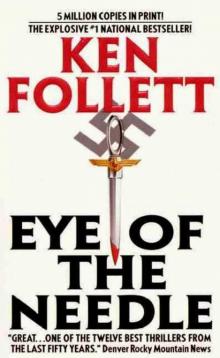 Eye Of The Needle
Eye Of The Needle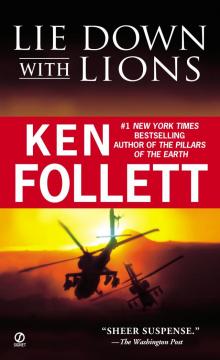 Lie Down With Lions
Lie Down With Lions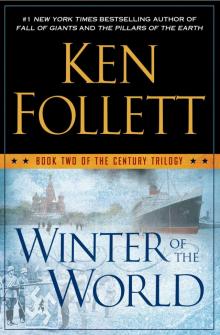 Winter of the World
Winter of the World Triple
Triple World Without End
World Without End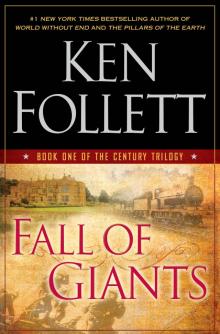 Fall of Giants
Fall of Giants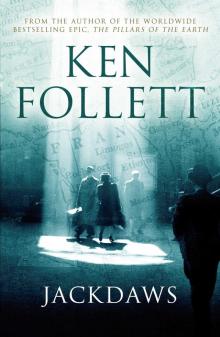 Jackdaws
Jackdaws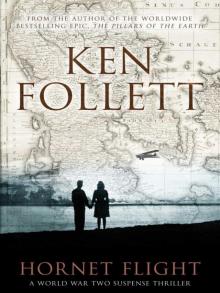 Hornet Flight
Hornet Flight Whiteout
Whiteout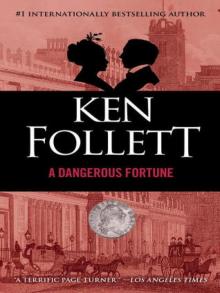 A Dangerous Fortune
A Dangerous Fortune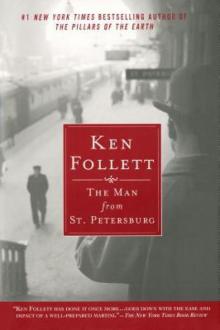 The Man From St. Petersburg
The Man From St. Petersburg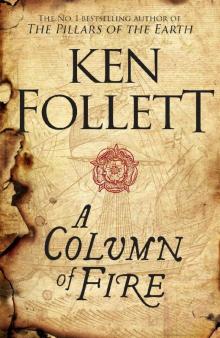 A Column of Fire
A Column of Fire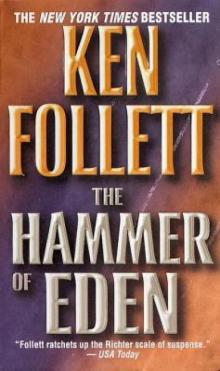 The Hammer of Eden
The Hammer of Eden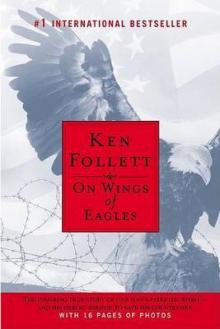 On Wings of Eagles
On Wings of Eagles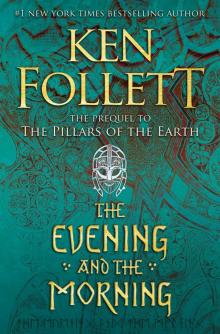 The Evening and the Morning
The Evening and the Morning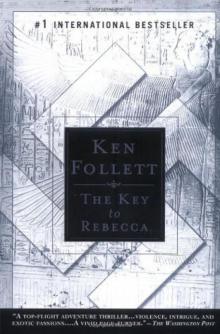 The Key to Rebecca
The Key to Rebecca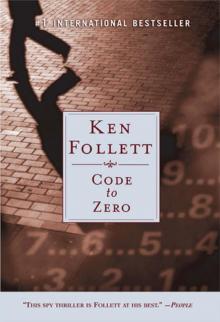 Code to Zero
Code to Zero Paper Money
Paper Money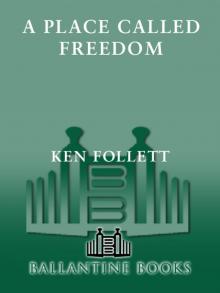 A Place Called Freedom
A Place Called Freedom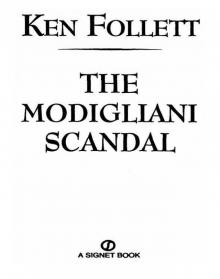 The Modigliani Scandal
The Modigliani Scandal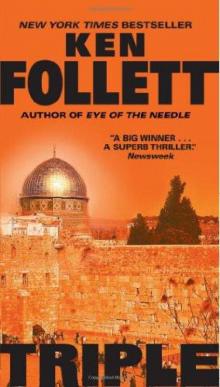 Triple (1991)
Triple (1991)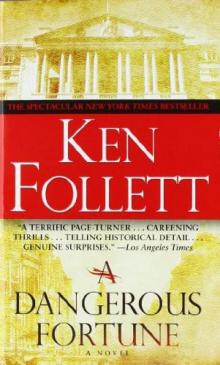 A Dangerous Fortune (1994)
A Dangerous Fortune (1994)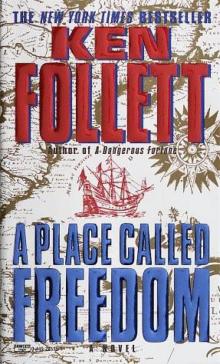 A Place Called Freedom (1995)
A Place Called Freedom (1995)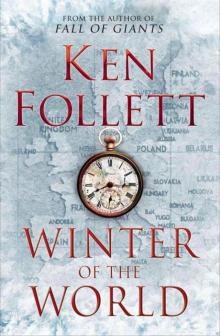 Winter of the World (Century Trilogy 2)
Winter of the World (Century Trilogy 2)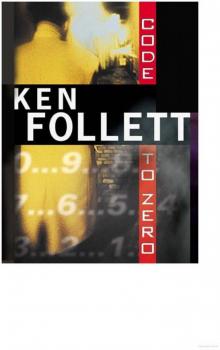 Code to Zero (2000)
Code to Zero (2000)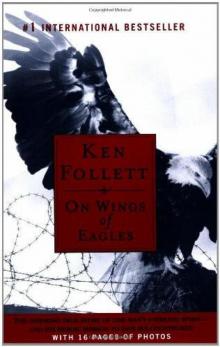 On Wings Of Eagles (1990)
On Wings Of Eagles (1990) Storm Island
Storm Island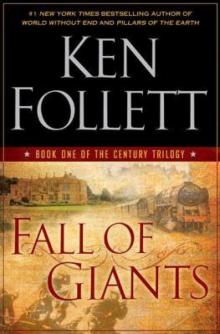 Fall of Giants (The Century Trilogy)
Fall of Giants (The Century Trilogy)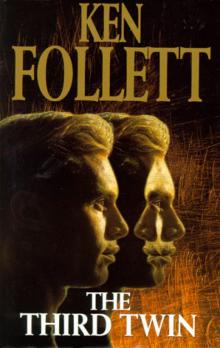 the Third Twin (1996)
the Third Twin (1996)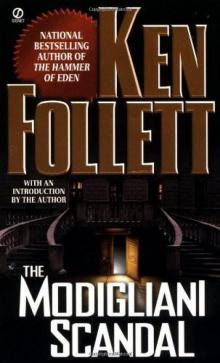 The Modigliani Scandal (1976)
The Modigliani Scandal (1976)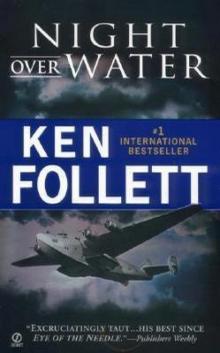 Night Over Water
Night Over Water